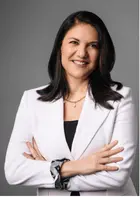SOM Alum Mary Ellen Iskenderian: “There’s Nothing Micro About a Billion Women”

On October 12, 2022, SOM’s Social Impact Lab hosted alum Mary Ellen Iskenderian (MBA ’86), President and CEO of Women’s World Banking. She discussed her book “There’s Nothing Micro about a Billion Women: Making Finance Work for Women,” which highlights stories of women whose lives have been transformed through access to financial tools.
Mary Ellen explained that financial inclusion for women means more than having a bank or mobile money account in their own name; it also includes having access to a safe place to save, to credit for larger services, to risk management and insurance products -- and to being met with respect in all of these. The macroeconomy realizes maximum benefits when it includes marginalized groups: inclusivity correlates directly with economic growth and profitability. Nonetheless, women continue to be systematically denied access to financial services and more than a billion women remain financially underserved.
Her book also discusses the micro impacts of women’s experiences after they receive access to financial tools. The book’s vignettes show that when women participate financially, their households, as well as their businesses, do better. Distinct cognitive and relational differences emerge in these households: as women gain control over financial resources, they play a greater role in decision-making, receive more respect from husbands, spend more money on the household (e.g., upgrades to the house), and children (both boys and girls) stay in school longer.
Clearly the macro and micro reasons to improve financial accessibility for women make sense. But why should this matter to financial institutions? In short, Iskenderian explained, they lose $700 billion in annual revenue when women get left out.
Throughout the discussion, Mary Ellen included stories about Women’s World Banking’s clients. In one example, a Jordanian woman expanded her food business using a loan from a microfinance institution, Microfund for Women, and became her family’s sole bread winner when her husband had a heart attack. His medical bills depleted her savings, but after gaining access to insurance products, she was able to pay subsequent medical expenses.
Another woman could not get a loan from a traditional bank for her business. She later received a sidecar loan through a simplified application process (developed by Women’s World Banking) and gained access to sufficient capital to expand her business. The simplified loan process, designed with women in mind, also improved financial services for men: the bank in this story saw a significant increase in loans to men as well as women over the next six months.
In closing, Mary Ellen encouraged us to to become conscientious consumers of financial services by adopting a gender-lens investing strategy, prioritizing diversity in leadership and governance, and encouraging financial and digital literacy early among marginalized groups. Financial opportunity for women means financial and social benefits for all.
